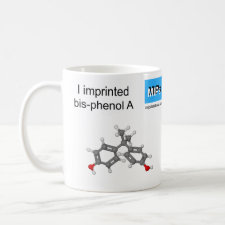
Authors: Shareena MS, Faizal CKM
Article Title: Influence of factorial design analysis on the performance of bisphenol A molecular imprinted polymer.
Publication date: 2012
Journal: International Journal of Chemical and Environmental Engineering
Volume: 3
Issue: (2)
Page numbers: 147-151.
Alternative URL: http://www.warponline.org/viewjc.php?id=j1&page_id=23&volume_id=5&content_id=15
Abstract: The main issue in the synthesis of molecular imprinted polymer nanoparticles is the identification and optimization of the key factors affecting the material structure and molecular recognition properties. This paper focus on the application of experimental design approach to synthesis bisphenol A molecular imprinted polymers (BPA-MIPs) aimed at the effect on polymerisation temperature, agitation rate, cross-linker to solvent ratio, and percentage of initiator; and determine the influence on hydrolysis breakage to remove template molecule, discussed by FTIR spectra results. The polymers were prepared under thermal suspension polymerization and their functional group stretching and degradation was evaluated. The results presented demonstrate the importance of keeping the right balance between the four parameters conditions which are approximately 55 °C, 100rpm, 65% solvent ratio and 1% initiator, respectively. The FTIR results shows that the particle sizes variation affects the performance of MIP where particles with 4 μm size reached 84% removal within time constrain rather than particles with 514 μm size only manage 40% of template removal. Generally, it could be concluded that smaller MIPs achieve removal better than the bigger ones and is expected to perform better in further investigations.
Template and target information: bisphenol A
Author keywords: bisphenol A, molecular imprinted polymers, FTIR, Full factorial design



Join the Society for Molecular Imprinting

New items RSS feed
Sign-up for e-mail updates:
Choose between receiving an occasional newsletter or more frequent e-mail alerts.
Click here to go to the sign-up page.
Is your name elemental or peptidic? Enter your name and find out by clicking either of the buttons below!
Other products you may like:
 MIPdatabase
MIPdatabase









